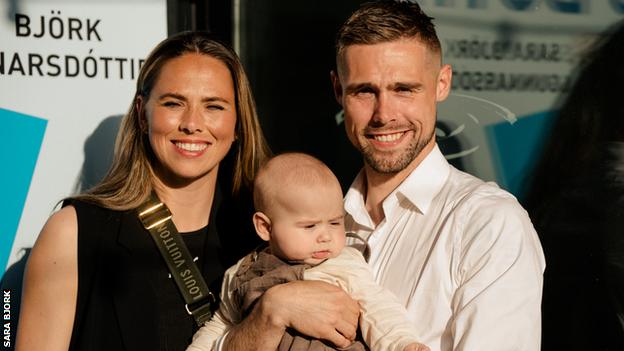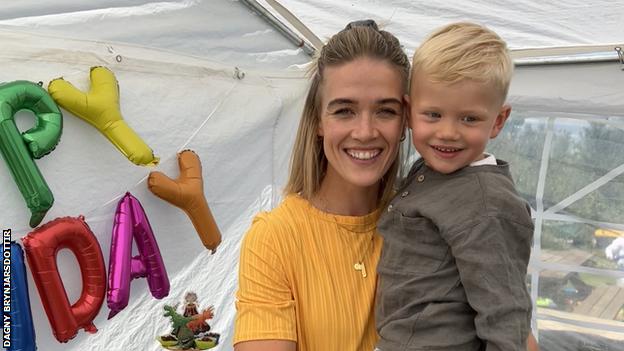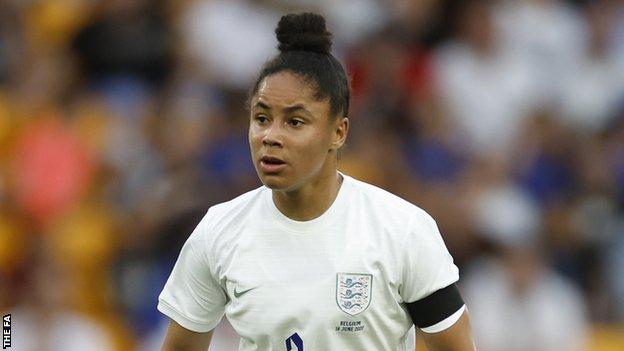Euro 2022: Iceland's Sara Bjork Gunnarsdottir on being a mother and professional footballer
Last updated on .From the section Women's Euro 2022

Football-playing mothers will figure in this summer's Euros like never before, with enough mums across the teams to form their own first XI and a handful of substitutes.
Iceland's line-up includes the most mothers, with five in total. That explains why, during their last competitive meet-up for World Cup qualifiers in April, the talk at one table turned to babies.
"I remember we were about six [players] sitting with a coffee and just talking about our birth experiences," the newest mum in the squad, midfielder Sara Bjork Gunnarsdottir, tells BBC Sport.
Having given birth to her son in November and with her sights set on a comeback in time for the Euros, the 31-year-old record caps holder now looks back on that chat as an important one.
"When you have role models playing and at a good level, having a baby and coming back, still on the national team, that did a lot for me," she says.
"We all go through our own experience, but to know they did it, it was inspiring for me and it still is, and it should be inspiring for all other women."
Of seven mothers aiming to make Iceland coach Thorsteinn Halldorsson's Euro squad, West Ham midfielder Dagny Brynjarsdottir, veteran defender Sif Atladottir, goalkeeper Sandra Sigurdardottir and her Valur team mate Elisa Vidarsdottir made the cut.
As did Gunnarsdottir, who had ended her season with minutes under her belt for club and country, signing off the campaign with Lyon as a Champions League and French league title winner.
Yet like Brynjarsdottir, who describes her comeback from the birth of her son Brynjar in 2018 as "the hardest thing I've done", it was a return that two-time Icelandic sportsperson of the year Gunnarsdottir had to battle to make happen.
First there were months of fitness training with a specialist coach in Iceland to stay in shape during her pregnancy; then similarly targeted exercises at Lyon as she worked her way back.
"I had doubts," Gunnarsdottir admits. "It's my first time getting pregnant and I don't know my body that way. I've done my anterior cruciate ligament and another injury, you know the steps, how you're going to feel, but with pregnancy you don't know how your body is going to react."
By March, she was fit enough to return to the pitch for 45 minutes away to Dijon.
"I remember in the middle of the game I just said to myself 'it feels so good'," she recalls.
Life away from the grass was testing, however. Her husband, midfielder Arni Vilhjalmsson, played 250 miles away for French Ligue 2 side Rodez and could only return for a couple of days a week.
A babysitter and visiting family helped, but Gunnarsdottir was often home alone, getting only a few hours sleep and sometimes forgetting to eat while she focused all her attention on her baby son Ragnar.
"I'll be honest, I hit a wall maybe three or four times when I would just break down because I was mentally and physically exhausted," she says.
"Then at the same time I was at my happiest. It's such an emotional rollercoaster.
"But I'm really proud of that time because I worked so hard to get back to the shape I'm in and show others you can be a professional football player and a mother at the same time.
"It's difficult, the most difficult thing I've done, but at the same time I love it, it's the most amazing feeling in the world."
'I'm stressed about the Euros'
In 2017, an employment report from world players' union Fifpro found that just 2% of players were mothers, many women quitting because of a lack of maternity policies to support them.
Since last year, new Fifa rules have set terms around paid maternity leave, with rights to return after pregnancy, breastfeed and gain access to independent medical advice.
Fifpro sees it as a first step. Gunnarsdottir's midfield partner at the last two Euros, Brynjarsdottir, 30, believes the right backing is key to a successful return after pregnancy.
"You have to have the right support system," she tells BBC Sport. "And a club that wants to support you, because when you bring a mum to a team, you're not only bringing in a football player, you're bringing in a family.
"You have to realise they're not thinking about football all the time, they have to balance other things and sometimes it's hard."

Brynjarsdottir, 30, made her comeback at Portland Thorns in the USA's National Women's Soccer League and in 2021 joined Women's Super League outfit West Ham. She praises both clubs.
Portland paid for her husband Omar to travel with her to away games while their son was a baby. West Ham allow her to bring four-year-old Brynjar into training if she ever needs to.
The Euros will hold a different challenge for the Iceland centurion, though, because players only have their children in camp if they are under a year old.
The federation say there is no blanket rule and they try to help their mothers on an individual basis so they are comfortable with their arrangements in camp.
Earlier this month, head coach Halldorsson changed the times of a home camp so his squad could spend as much time with their families before the Euros as possible.
But with a 12-day pre-camp in Germany and Poland before the tournament kicks off, Brynjarsdottir knows this could be the longest she has been apart from her son.
"To be honest I am a bit stressed for the Euros because we will be gone for a while," she says. "I feel we're quite attached still, the both of us. It's hard when I know my son wants to be with me and can't be.
"Mentally you just have to stay focused and every time you can get out of the hotel, use that time to see family."

Policies vary across teams. Belgium's Lenie Onzia, the Netherlands' Sherida Spitse and Stefanie van Der Gragt, and England's Demi Stokes can see their respective children on family days.
Sweden's Lina Hurtig, Hedvig Lindahl and Elin Rubensson can see their children in free time, their FA offering a "family trip" for relatives to follow the team and live together.
Germany's Almuth Schult can have her partner and children with her. Gunnarsdottir's baby can join her at what will be her fourth European Championship, with the federation paying for a "support person" throughout.
Brynjarsdottir believes all the mothers on their team will support each other on "difficult days" when they are missing their children, but hopes changes can be made to accommodate them in the future.
"Hopefully we can make better contracts in the autumn that will suit mums better," she says. "I know some mums just like when they go to camp to take time for themselves.
"But I'd like to take him with me and I feel like it should be up to me.
"It's probably not going to be like that while I'm still playing, but hopefully for the younger generation, so it will be easier for the mums who will be here later on."
Between them, Iceland's mothers boast more than 400 caps, but Gunnarsdottir hopes they will bring more than playing experience to the table at the Euros.
"We as players are quite selfish - it's all about your career and your training, diet, sleep," she says. "But it's different now, you prioritise your baby.
"I think that gives a good dynamic to the team because I myself feel more sympathetic towards my team-mates and others, it's hard to describe it, but I'd like to hope it gives something to the team for sure."

- Saudi Arabia's $2bn golf series: What's the controversy surrounding the new tournament?
- Our Falklands War: Unflinching personal experiences of a short but brutal war




















